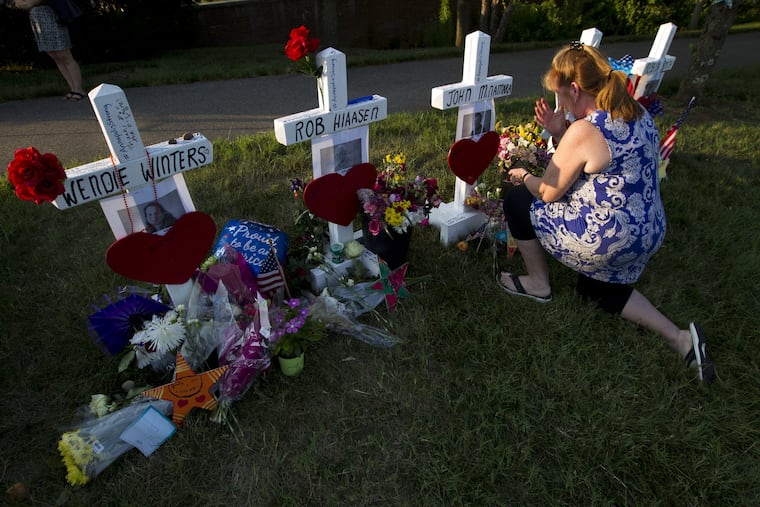The hate we get: Why journalists need to stop accepting threats as part of the job | Helen Ubiñas
Even before the horrific newsroom shooting in Maryland, hate mail and threats against reporters should have been better addressed.

As it turns out, one of my vilest trolls is a guy who isn't much older than I am and who lives close enough that it's entirely possible that we've crossed paths, maybe even held a door open for one another.
If life in the Era of Trump has taught us anything, it's that the racist is often the guy next door.
Apparently, Mr. Troll and the elderly father he cares for were taken aback when a Philadelphia police detective played them a recording of one of his nastier calls to me.
Every time I post one of these calls or emails or tweets or texts — there is not a platform that trolls have not trashed, including our comments section — I inevitably get someone asking why I do it. Why give hate a platform?
Why? Because … receipts, but also because for years journalists — women and journalists of color especially — were expected to absorb the threats and hatred in silence, while others, often in the very same newsrooms, had the luxury of being blissfully unaware.
Part of the job. We all get it. Buck up.
That was BS then. And it's BS now.
But then came a president who at least in one regard doesn't discriminate: The "elite liberal press" — no matter the gender or ethnicity — is "the enemy."
And suddenly the reporters who had the privilege of dismissing the vitriol since it didn't affect them got a taste of what many reporters have faced for years.
Gripes turned murderous when the Annapolis Capital and Maryland Gazette journalists were gunned down in their own newsroom by a guy with a long-running dispute with the papers. A columnist had written, accurately, about a criminal harassment case against him.
As the horror in Maryland unfolded — five people dead, two injured, a newsroom and a community rocked — other newsrooms rushed to protect their people, forced to acknowledge the reality that merely doing their jobs can put a target on journalists' backs.
Police were posted outside the New York Times, ABC News and Fox News. My own Philadelphia Media Network is stepping up security. To his credit, Philadelphia Police Commissioner Richard Ross wasted no time coming to our newsroom to tell us we should take threats seriously, including the one I got a couple of months ago from the aforementioned troll.
I told the detective who followed up on the threats against me that I wasn't interested in pressing charges as long as the caller stopped. So the officer paid the man a visit and told me to keep his number handy in case the caller started up again.
I am glad and grateful to see the attention now being paid by many news organizations.
I just wish it had happened sooner.
It also makes me think of how slow we are in journalism to deal with our own issues, whether it be lack of diversity and inclusion, wage disparity, or hostile work environments — issues we'd pounce on if they were happening in another organization.
Trolls and threats are part of life behind the bylines, for sure. But as Alexandria Neason put it in Columbia Journalism Review, so is balancing our responsibility to our assignments with our own personal rage.
I'm talking about news cycles that are not just relentless, but incredibly personal especially for – again — women and journalists of color, as the rights of women and marginalized communities are increasingly threatened, as we cover the stories and struggles of people who look like us, our immigrant parents, our black and brown sons and daughters and nieces and nephews.
During an especially bad week that included immigrant children being separated by their families, caged and abused, and the announced retirement of the Supreme Court justice who provided the swing vote on critical human-rights cases, I found myself looking for someone to talk to about the stress that I could feel spilling over, and when I couldn't find anyone, I found a private corner in the newsroom to engage in some self-care, which for me meant a short rage cry.
And then later that day, I came across some young journalists of color huddled together, talking about how exhaustingly personal the news cycle felt, and how they weren't sure whom to talk to or how to deal with it. The exhaustion isn't in the same league as dodging bullets, but it's all part of a continuum in which journalism today comes with personal costs — and that newsrooms need to address.
I copped to the therapeutic cry, and then I suggested they keep doing what they were doing: reach out to one other, lean on each other. I tried to find a few articles that might help; I didn't find many. I gave an editor a heads up about good reporters who deserve support.
I'm not in charge; I don't know what that will look like. But I do know that we have to do better than the delayed reaction to hate and threats, and at the very least acknowledge how physically and emotionally draining it is when looking at the people in the news feels a lot like looking in the mirror.
We have to do right by our colleagues, but even more important, we have to do right by the people who depend on us to be vigilant in promoting and protecting the truth, to keep healthy and keep up the fight against the real enemy.